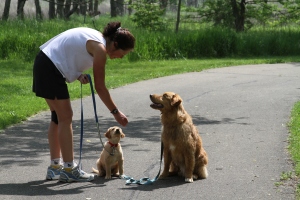Trainers who use reward-based training methods (aka positive reinforcement training) often expound about its benefits to dogs and likewise caution about potential risks associated with punishment-based training. Although not extensive, there are a few studies that support the behavioral and emotional benefits of reward-based training and several others showing that the use of aversive stimuli (typically e-collars) can be emotionally and behaviorally harmful to dogs. (For a review of these research studies and references, see Chapter 8 in my newest book, “Dog Smart“).
However, training is something that is shared by owners and our dogs, and does not impact only our dogs. It is equally important to understand what, if any, effects that various training methods may have upon owners themselves and on the bond between owners and their dogs. Specifically, do we have evidence that reward-based training supports a stronger bond with our dogs or that, conversely, punishment-based training may damage this relationship?
Evidence with Human Subjects: There is evidence (quite a bit actually) that doing something to help another person and using positive reinforcement when instructing someone encourages a favorable attitude towards that individual. In other words, we tend to like people who we are nice to and treat well. Similarly, we tend to think poorly about people who we treat badly or punish. I address the implications of this research in the Science Dog Essay “The Ben Franklin Effect“. However, this phenomenon has not (yet) been studied directly with people and dogs. A study published last month comes rather close.
The Study: Researchers at Purdue University recruited a group of 111 US military veterans who were currently living with a Service Dog. The owners were predominantly male (80 %) and had received their dog as an aid for PTSD-related disorders. The objectives of the study were to examine the relationship between the training methods used by the owners to maintain their dog’s training (i.e. subsequent to the dog’s training as a Service Dog) with the dog’s behavior, their relationship with their dog, and the owner’s PTSD symptom severity. The researchers classified training methods into five categories: positive reinforcement, negative punishment, positive punishment, dominance (i.e. use of alpha rolls), and bond-based (i.e. sharing food, co-sleeping). For a review/explanation of the first three categories, see “The Consequences of Consequences“). The dog owners completed an on-line survey asking how often they used a range of training methods with their dogs. It also collected information about the dog’s behavior and temperament and about the relationship between the owner and dog. (Note: For the purposes of this essay, I am focusing primarily on the objectives and results that examined associations between training methods and the bond between dogs and their owners).
Results: All of the participants reported using methods that fell into one or more of the five training categories, in varying frequencies. When associations between the type and frequency of method used and aspects of the human-dog bond were tested, the following relationships were found:
- Positive reinforcement (reward-based) methods: The frequent use of reward-based training (praise, petting and food treats) was positively and significantly correlated with higher scores for “closeness” with dogs, increased attachment and attention-seeking behaviors, and higher levels of activity and playfulness in the dog.
- Punishment-based methods: The frequent use of punishment-based training (verbal reprimands, collar corrections) was significantly correlated with lower scores of “closeness”, higher scores for fear in the dog, reduced eye contact between the owner and dog, and a lower perception of the dog’s trainability.
- Bond-based methods: About 50 percent of the participants reported that they co-slept with their dogs daily. More frequent use of bond-based training was associated with higher degrees of closeness with their dog and lower level of activity.
Conclusions: The researchers conclude that these data support an association between the use of reward-based training methods and positive outcomes for dogs and for the relationship between the dogs and their owners (higher degree of closeness and attachment). Conversely, the frequent use of punishment was associated with fearfulness and reduced eye contact in dogs, and a less close relationship.
Take Away for Dog Folks: First and foremost, remember that important principle:
The existence of a correlation (dogs trained daily with positive reinforcement were found to have closer relationships with their owners) does not necessarily mean that using +R caused these closer relationships (though, of course, many of us like to believe that it does). And, we could be right, of course. It is just that demonstrating an association between two things does not provide evidence of one of those things causing the other.
In the case of these data, it is equally possible that owners who have strong and loving bonds with their dogs are more likely to choose to use reward-based training methods than those who are less bonded. The results would be the same, but the underlying relationship between the two factors would be different. Similarly, the use of punishment may indeed be a causal factor in reducing the level of attachment between owners and their dogs. However, it is also possible that owners who are less attached to their dog are then more predisposed to using punishment to change behavior. (Though, as the authors also note, this sequence does not explain the higher level of fear in the dogs trained with punishment).
So, while these data provide support for the belief that reward-based training methods enhance our bonds with our dogs, we must be cautious about interpretation. As with all research, this study and the evidence that it provides adds to our increasing knowledge base about what is best for our dogs and for our relationships with them.
Happy (reward-based) Training!
Cited Study: LaFollette MR, Rodriguez KE, Ogata N, O’Haire ME. Military veterans and their PTSD service dogs: Associations between training methods, PTSD severity, dog behavior, and the human-animal bond. Frontiers in Veterinary Science 2019; 6:23. doi: 10.3389/fvets.2019.00023
New Science Dog Book!
“Feeding Smart with The Science Dog” by Linda P Case
Description: In The Science Dog’s latest myth-busting book, Linda Case takes on canine nutrition and feeding practices. It seems that almost everyone has an opinion about how our dogs should be fed and what diet is healthiest for them. In this timely book, Linda Case takes a look at the evidence and what answers science can provide regarding how to best feed our dogs. The book’s five sections each tackle a set of commonly posed questions, using the research of leading nutritionists to provide practical answers. If you wonder whether dogs are true carnivores, whether or not they can digest grains, why some dogs gain weight so easily, and if it is safe to feed your dog a raw diet, this book has the answers for you. Other chapters separate nutrition fact from fiction regarding omega-3 fatty acids, dietary supplements, the quality of pet food ingredients, and nutrient needs and dietary preferences of dogs. Whether you are a canine health professional, trainer, work with a shelter or rescue group, own a dog-related business or simply wish to understand nutrition and feeding better, the information provided in “Feeding Smart” will be of interest and value to you.
About the Author: Linda Case is a well-known science writer, canine nutritionist, and dog trainer. She is the author of eight other books, as well as the popular “Science Dog Blog”. She taught at the University of Illinois’s Department of Animal Sciences and College of Veterinary Medicine and currently owns The Science Dog Courses, an on-line professional training school for dog owners and professionals.
Interested in learning more about dog training and behavior? See “Dog Smart: Evidence-based Training with The Science Dog“!






It might be possible that people with compassionate relationships seek out reward-based training. Were it not for all the corroborating studies on the efficacy of science-based training as well.
LikeLike
Pingback: #29: Drops: Treinamento e relacionamento baseado em recompensas, Linda Case – Meu Nome Não É Não
Pingback: Barks.in | The Indian Pariah Dog. The dog that all love, but no one wants!
Pingback: Dog Training: When To Reprimand And When To Reward - Alpha Trained Dog
Pingback: Dog Training Science Resources – Alaska Dog Works
Pingback: Are Basset Hounds Hard To Potty Train?
Pingback: What Dog Owners Think about Lead-Pulling | The Science Dog